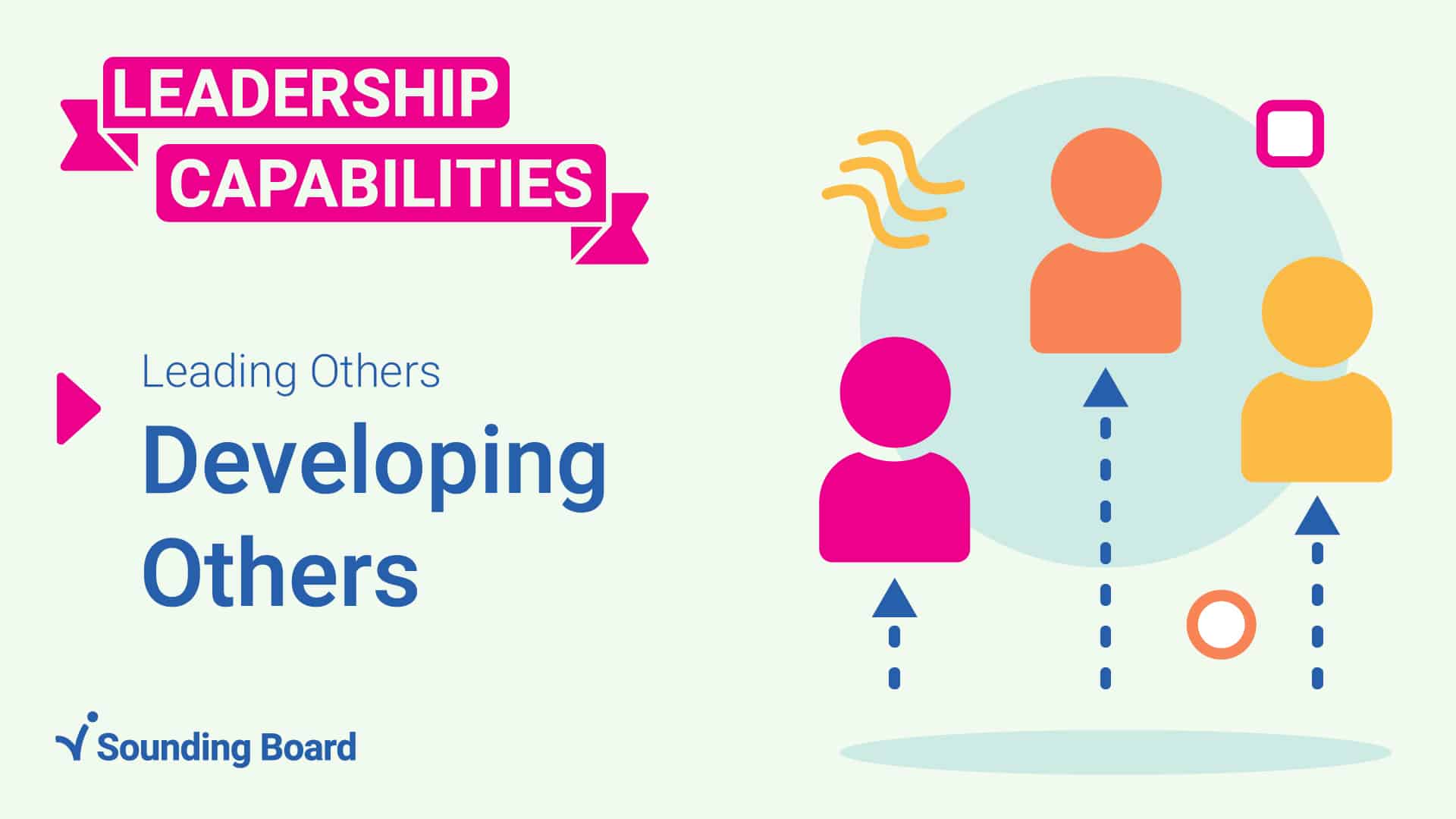This blog is part of a 16-part series focused on what capabilities make a strong leader. Sounding Board has identified 16 leadership capabilities that the strongest leaders possess. These were developed from research-backed leadership theories, leadership competencies used for evaluation from top business schools, and 25+ years of practical coaching application.
The pandemic has seen many people resign. As a result many organizations are facing a talent shortage. Employee engagement is crucial for any organization that aims to retain top talent and attract new talent. One of the best ways to boost employee engagement is to offer opportunities for employees to develop their skills.
Research shows that most employees value an organization that provides opportunities to develop new skills. Good leaders recognize the importance of this and go out of their way to help their team grow as individuals and as a team.
What does it mean to develop others?
It is said that the mark of a good leader is that they create a vision that outlives their leadership. This vision must be shared and carried out gradually by other adept team members. Such an enduring impact is the result of conscientious investments in leadership and employee development.
For today’s leaders, developing others requires anchoring your thoughts to the individual and looking outside of the self. That personalization is one reason leadership coaching is so effective as a development tool. However, it’s important to reflect on a few questions to help guide your conversations with your team members. What is the individual like? What are their essential qualities? What are some of their important contributions? Where are they looking to make improvements?
It’s on the leader to understand team dynamics and how individuals operate within them in order to help others develop. The best leaders know how to draw out their employees’ strengths. They also put in the time and effort to help them develop within their teams because they understand the impact this has on their organizations. As people grow and improve in their capabilities, so too does your business.
What are the qualities of leaders who develop others?
A leader with strong skills in developing others will:
- Co-create strategies to address development needs.
- Provide timely, specific, constructive, and positive feedback.
- Create opportunities for team members to expand their skills.
- Identify and agree on professional and personal growth priorities with team members.
- Align employees’ developmental opportunities to the organization’s strategic needs and plans.
Benefits and importance of developing employees
A carefully thought-out employee development strategy is essential at multiple levels. That’s one key reason that leadership coaching is no longer solely reserved for the most senior leaders. When used correctly, leadership coaching can serve a wide range of benefits for all involved, including employees, HR managers, really anyone in any functional area of the business. Some of these benefits include:
- Performance improvement: For companies to remain competitive in their niche, an organization must continue to outperform the competition. In fact, according to a meta-analysis from Gallup, companies with the highest levels of employee engagement showed 21 percent higher levels of profitability. Staff development can help an organization meet and even exceed expectations because it keeps people’s skills up to date and improves the bottom line.
- Better equipped to handle the unexpected: Today’s business climate is all about adapting to change, but change can be a challenge for employees and businesses. However, if it’s appropriately managed, new changes can open up unexpected opportunities. With supportive leadership, consistent employee development, and leadership coaching, you and your team will always be up for the challenge.
- Attract new employees and improve loyalty: Businesses cannot attract the best and brightest talent and stay competitive without offering the best terms in the market. Companies today are more competitive and agile, and employees are more actively involved in securing a culture of learning and knowledge sharing from their employer. They know develop is key to their growth, and the companies that offer it, win. Promoting leadership development plans that feature personalized leadership coaching helps to create an attractive, supportive work environment, especially when compared to stagnant businesses set in outdated, company-first ways.
- Retain employees: Investing in a leadership coaching program for employees to ensure that they can do what they need to keep your business up and running is a proven retention strategy. Further, employee development can be a significant cost saver in the long run. According to The Society for Human Resource Management, it costs a company 6 to 9 months of an employee’s salary to replace him or her. For an employee making $60,000 per year, that could mean $30,000 – $45,000 in costs. Instead of losing potential talent, it makes more sense to your bottom line to develop your current talent rather than invest in sourcing new talent.
How do leaders develop others?
As a leader, there are a few vital things you can do to develop your team, and increase employee satisfaction and retention. Here are four essentials when developing others:
- Prioritize performance management: Employees are more likely to feel more positive about their individual development if their leader reviews and discusses their performance with regular feedback, and gives them stretch assignments. With the right leadership coaching program, that happens automatically.
As a leader, it’s easy to over-concentrate on critical organizational tasks. You can focus so much on business details that you forget to focus on your team and direct reports’ performance. Leaders who resist developing their employees assume that employees’ current performance represents their best effort. That is definitely not the case. Leaders who make time to review performance, discuss development plans regularly, and challenge team members to accomplish stretch goals, see and develop greater potential. - Involve team members: Involving your team members in their own development and decisions that impact your business goals makes them feel better about their growth opportunities. Team members appreciate development when they can contribute and participate. When opportunities for advancement are linked to their passion, they become more motivated and in turn, more loyal.
- Recognize and reward hard work: Most employees appreciate being recognized for their hard work or effort. When leaders do their best in recognition, their employees feel good about their progress and feel like valued members of the team. Development without receiving credit is like a completed task that’s never acknowledged or reviewed. It takes a lot of effort, and with no follow up it can feel like no one cares.
- Ensure the job fits the person: Some people will be much better at some jobs than others, and getting a job that suits a person’s ability helps that individual, and ultimately the organization wins. The best leaders help their team members find their niche. They see team members for their strengths and help them succeed in that context.
Employee development is the process of ensuring that your talent becomes more effective and is capable of tackling major or critical challenges. Like leadership development and leadership coaching, developing others is an imperative for all people managers.
At Sounding Board, we understand it can be challenging to balance all the responsibilities of being a great leader. That’s why we’ve developed leadership coaching solutions that are specially designed to help you help others. Our coaches are highly trained and qualified to design coaching programs that best suit your organization’s needs. Request a demo today.









